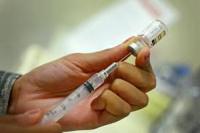-
Online anti-vax efforts prove daunting public health challenge
Earlier this week New York City Health Commissioner Oxiris Barbot blamed a small group of anti-vaccine advocates for their role in an ongoing measles outbreak among the city’s Orthodox Jewish population. In many Western countries, public health officials and scientists charge that an aggressive, conspiracy-fueled misinformation campaign by anti-vaxxers has caused the re-emergence of preventable diseases such as measles.
-
-
Anti-vaxxers are spreading a virus that just won’t die
In 1995, Andrew Wakefield began researching a possible link between autism and the measles, mumps and rubella (MMR) vaccine. Sarah Baxter notes that he was a fraudster, and that he was struck off the medical register in Britain in 2010 but, after moving to the U.S., he has become something of a celebrity, and is supported in his bogus views by Donald Trump. In the past, some religious communities rejected vaccination, but now they have been joined the hippie-dippy boho middle class and the conspiracy-minded global far right. The result: a scary rise in dangerous infectious diseases which were on the verge of eradication.
-
-
Do armed guards prevent school shootings?
The presence of guns in schools is a fact of life for millions of American children. Forty-three percent of public schools had an armed law enforcement officer during the 2015-2016 school year. Does increasing armed school security could reduce deaths from active shootings or deter the attacks in the first place? Experts say the data is not encouraging. Guns have stopped some mass shootings — but not usually in schools.
-
-
2017 DRC Ebola event tied to novel strain, as current outbreak grows
A new analysis of a 2017 Ebola outbreak in the Democratic Republic of the Congo (DRC) that occurred in a remote location and was limited to sixteen cases involved a novel variant of the virus and was probably triggered single spillover, according to a new study.
-
-
Inoculating against misinformation
In the lawless eastern provinces of sub-Saharan Africa’s biggest country, an Ebola outbreak that has quietly become history’s second-largest epidemic may wind up turning not on drugs or quarantine, but on a third, often underappreciated factor: trust.
-
-
Hackers can dupe radiologists, AI software
Hackers can access a patient’s 3-D medical scans to add or remove malignant lung cancer, and deceive both radiologists and artificial intelligence algorithms used to aid diagnosis, according to a new study.
-
-
Pox on everybody’s house
It was not so long ago that a NIH scientist stumbled across smallpox vials in a cold-storage room — and it was not during a time of increased concern for synthetic biology. Pandora Report notes that from CRISPR babies to garage DIY biohacking kits, it seems like the last few years have been inundated with synbio conversations.
-
-
Anti-vaxxers appear to be losing ground in the online vaccine debate
As measles outbreaks spread across the U.S., our new look at how information about vaccine safety and reliability spreads online suggests that the tide may be turning against the anti-vaccination movement.
-
-
Saving millions of lives by rapidly shifting to renewable energies
Reducing global air pollution can prevent millions of premature deaths according to an international team of scientists. The most significant contribution would be the rapid phasing out of fossil fuels, which is currently being discussed mainly to abate climate change.
-
-
The high dollar cost of the anti-vaccine movement
There conspiracy-fueled anti-vaccine movement has real costs: Aside from the hundreds of cases of vaccine-preventable diseases, associated deaths, long-term health consequences, and strain such illnesses takes up on the healthcare and public health system – the anti-vaccine movement has additional consequences which are truly expensive.
-
-
In disasters, Twitter users with large networks get out-tweeted
New study shows that when it comes to sharing emergency information during natural disasters, timing is everything. The study on Twitter use during hurricanes, floods and tornadoes offers potentially life-saving data about how information is disseminated in emergency situations, and by whom. Unlikely heroes often emerge in disasters, and the same is true on social media.
-
-
A billion more people will be exposed to diseases as world temperatures rise
As many as a billion people could be newly exposed to disease-carrying mosquitoes by the end of the century because of global warming, says a new study that examines temperature changes on a monthly basis across the world.
-
-
NY County declares emergency over measles outbreak
So far this year, more than 300 people have contracted measles in 15 states in the U.S. Almost half of those cases occurred in Rockland County, just north of New York City.
-
-
Italy imposes heavy fines on parents of unvaccinated schoolchildren

Italian media reports that across Italy, parents are falsifying vaccine documents to prevent their children from being barred from attending school. These parents are responding to a new law, which imposes fines of thousands of euros for not vaccinating their children.
-
-
California hospitals to pay billions for seismic safety upgrades
California hospitals would need to make substantial investments—between $34 billion and $143 billion statewide—to meet 2030 state seismic safety standards, according to a new report.
-
More headlines
The long view
Ransomware Attacks: Death Threats, Endangered Patients and Millions of Dollars in Damages
A ransomware attack on Change Healthcare, a company that processes 15 billion health care transactions annually and deals with 1 in 3 patient records in the United States, is continuing to cause massive disruptions nearly three weeks later. The incident, which started on February 21, has been called the “most significant cyberattack on the U.S. health care system” by the American Hospital Association. It is just the latest example of an increasing trend.
